Football
Karim Benzema the Ballon D’or winner of the year 2022

Karim Benzema was honoured with the Ballon d’Or in 2022 during a ceremony that took place on Monday in Paris. This was in recognition of his outstanding performance during the 2021-22 season, during which he led Real Madrid to a Champions League and La Liga double.
The 34-year-old Benzema scored a career-high 27 goals in LaLiga and led all scorers in the Champions League with 15 goals, including hat tricks against PSG and Chelsea. He also set a new record for most goals scored in a single league.
He ended in first place, which put him ahead of Sadio Mane of Bayern Munich and Kevin de Bruyne of Manchester City, who finished in second and third, respectively. The attacker for PSG, Kylian Mbappe, finished sixth, while the forward for Manchester United, Cristiano Ronaldo, finished 20th.
Benzema stated, “I’m incredibly proud seeing this prize, it’s been my ambition since I was a kid. I grew up with this in my brain, and after that I had the determination,” and he was speaking about winning the award.
It’s a lot of effort; I never gave up, and I maintained that goal in my brain. Anything is possible.” “I had two role models in my life: Zizou [Zinedine Zidane] and [Brazil superstar] Ronaldo. It’s a lot of work; I never gave up, and I kept that dream in my head.”
There was a period when I wasn’t playing for the national team, but I didn’t give up. It’s been difficult for me, and it only makes me stronger psychologically. I’m extremely delighted with my work. “It’s been difficult for me. There was a time when I wasn’t playing for the national team, but I didn’t give up.”

During a ceremony that took place at the Theatre du Chatelet in Paris, the France international was presented with the honour that is given out annually by the publication France Football. This was the first time in his career that he had won the award.
The previous day, Benzema scored the first goal as Real Madrid defeated Barcelona 3-1 in El Clasico. With this victory, Madrid moved three points ahead of Barcelona atop the LaLiga standings.
He is the first Madrid player to win the award since Luka Modric in 2018, and the first Frenchman to win since Zidane, who presented Benzema with the trophy in 1998. Modric was the last Madrid player to get the accolade.
“I’d like to thank my teammates at Real Madrid and the national team, my president [Florentino Perez] who is like family to me, and also the Lyon academy and president [Jean Michel] Aulas, thanks to him I fulfilled my dream of playing for Real Madrid,” Benzema said. “I’d also like to thank the Lyon academy and president [Jean Michel] Aulas, thanks to him I fulfilled my dream of playing for Lyon.”
The epidemic caused by COVID-19 prevented the award from being presented in 2020, hence Lionel Messi was the recipient of the Ballon d’Or in 2019 and 2021.
During his time at Real Madrid, Benzema has won five Champions Leagues, four LaLigas, two Copas del Reys, four UEFA Super Cups, and four Spanish Supercopas. He also has a total of 13 trophies to his name.
Benzema’s achievements in the Champions League last season earned him considerable praise. He scored 10 goals in Madrid’s knockout round triumphs over PSG, Chelsea, and Manchester City on the way to capturing the club’s 14th European Cup. These victories helped Madrid win the Champions League.
After a six-year hiatus from the France national team, he returned to assist them win the UEFA Nations League in 2021 and is anticipated to lead their assault at the 2022 World Cup in Qatar. His comeback to the squad came after he had been away from the team for six years.
Gavi, a midfielder for Barcelona, was awarded the Kopa Trophy, which is given to the player under the age of 21 who is deemed to be the greatest in his position.
Gavi, who turned 18 in August, was able to take first place in the competition, beating off Jude Bellingham of Borussia Dortmund and Jamal Musiala of Bayern Munich. He takes up the title from his colleague at Barca, Pedri, who won it the year before.
Gavi made a total of 47 appearances for Barca across all competitions in 2021-22, scoring two goals. This followed his breakthrough into the first-team system the previous year at the age of 16 years old.
As a result of his outstanding play for the Catalan club, he was called up to the Spain national team, and at the age of 17 years and 62 days, he became the youngest player in the history of La Roja to ever compete for the squad.
Since then, Gavi has earned 12 caps for Spain and is currently a regular for both his club and his nation as they head into the World Cup next month.
In the meanwhile, the Gerd Muller award for the greatest striker of the year was given to Robert Lewandowski, and the Lev Yashin award for the best goalkeeper was given to Thibaut Courtois of Real Madrid.
The organisers of the Ballon d’Or award now also present a humanitarian medal, which bears the honour of the late Brazil player Socrates. Mane was awarded the trophy in recognition of his charitable activities in Senegal, which included the construction of a hospital and donations to schools.
Football
Luis Rubiales FIFA Ban: Three-Year Prohibition by FIFA
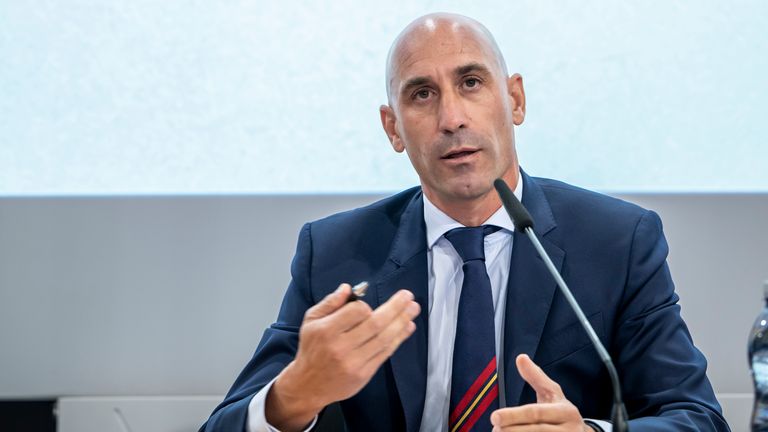
The global governing body of football, FIFA, delivered a strong message on Monday as it issued the Luis Rubiales FIFA ban, prohibiting former Spanish football federation chief Luis Rubiales from all activities related to the sport for a period of three years. This consequential decision comes in the wake of a controversy that emerged during the Women’s World Cup earlier this year. Reports revealed that Rubiales was found guilty of gross misconduct, specifically for an incident that overshadowed Spain’s victory at the World Cup trophy ceremony in Sydney.
The Controversial Incident
A disciplinary committee was promptly assembled to investigate the disturbing incident, yet the specifics of the verdict have not been disclosed to the public. Rubiales faced severe charges related to what FIFA described as a violation of the “basic rules of decent conduct” and “behaving in a way that brings the sport of football and/or FIFA into disrepute.” The episode in question pertains to an incident where Rubiales forcibly kissed a Spanish player on the lips during the trophy ceremony, tainting what should have been a moment of triumph for the nation’s football team.
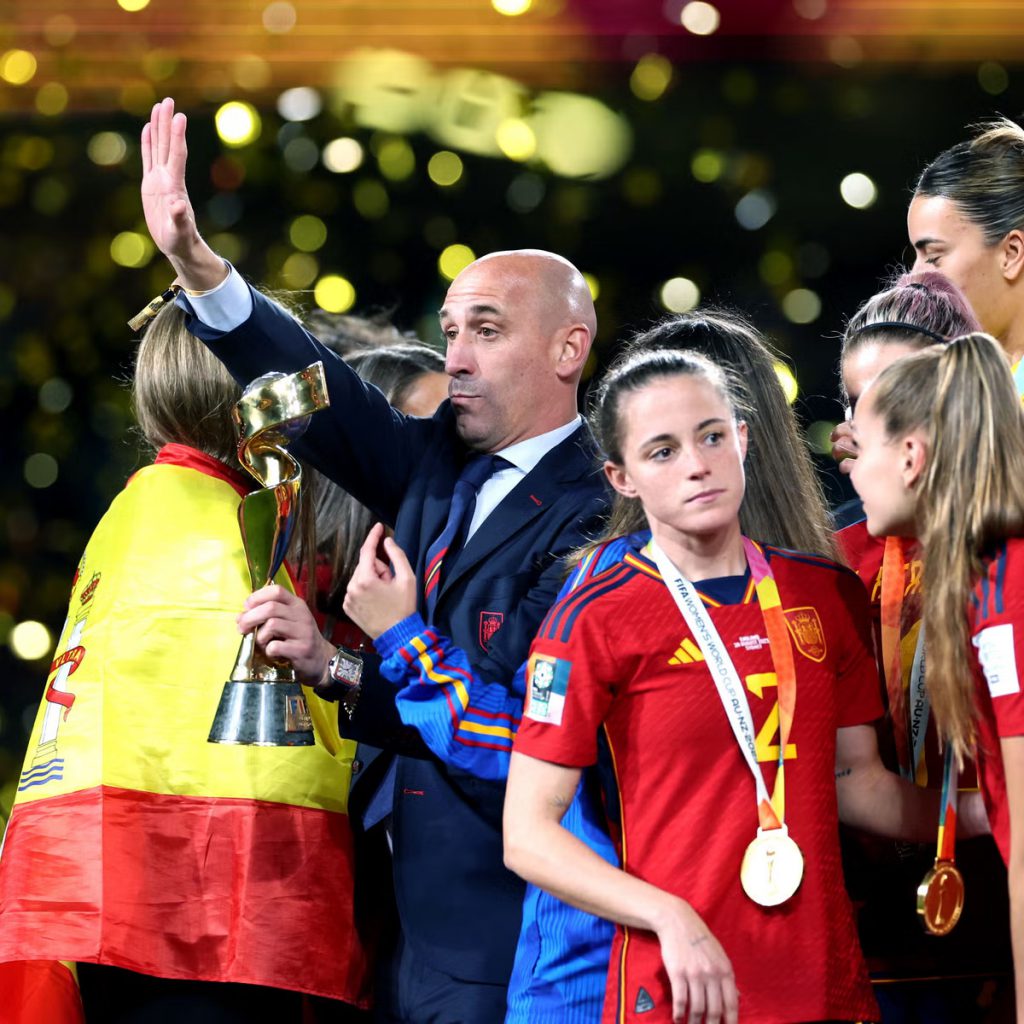
Misconduct and Resignation
The aftermath of the incident was marked by Rubiales’s initial defiance and refusal to acknowledge any wrongdoing, leading to a prolonged period of controversy. However, mounting pressure from various quarters, including the Spanish government and the national team players, eventually forced Rubiales to resign from his esteemed position within the Spanish football hierarchy. The incident not only tarnished Rubiales’s reputation but also cast a shadow over the accomplishments of the national team.
Ban and Appeal
While the FIFA ban on Luis Rubiales has been imposed for a duration of three years, Rubiales still has the option to contest the verdict. FIFA has granted him a window of ten days to request a review of the decision, following which he can file an appeal with the governing body. It remains to be seen how Rubiales will proceed in light of this substantial ban.
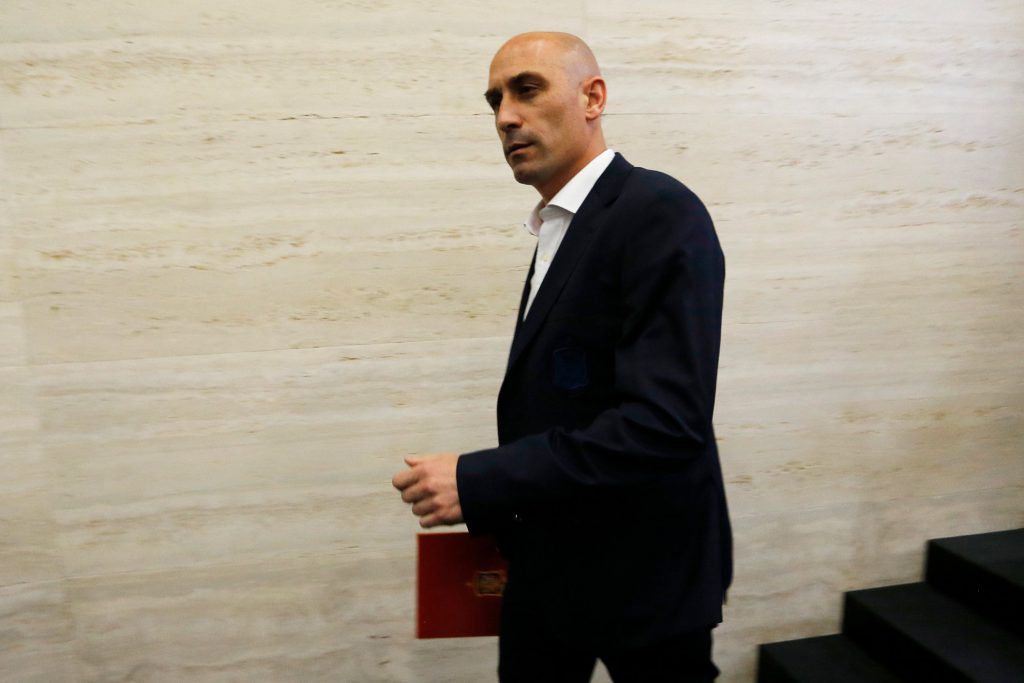
The Response and Controversy
Despite facing widespread backlash, Rubiales has garnered some support, notably from his mother, Angeles Bejar. In a bold demonstration of solidarity, she initiated a hunger strike to protest what she described as “the inhumane and bloody hunt” against her son. While some may sympathize with Rubiales, the gravity of the incident and the subsequent ban imposed by FIFA underscore the importance of maintaining integrity and respect within the world of professional sports.
In conclusion, FIFA’s decisive action against Luis Rubiales serves as a reminder that no individual, regardless of their position, is above the fundamental values of respect and sportsmanship that form the bedrock of football’s global community. As the sport continues to evolve, the need for upholding ethical standards remains paramount, ensuring that the spirit of fair play and camaraderie endures for generations to come.
Football
Rubiales Scandal: Soccer’s Integrity Unveiled
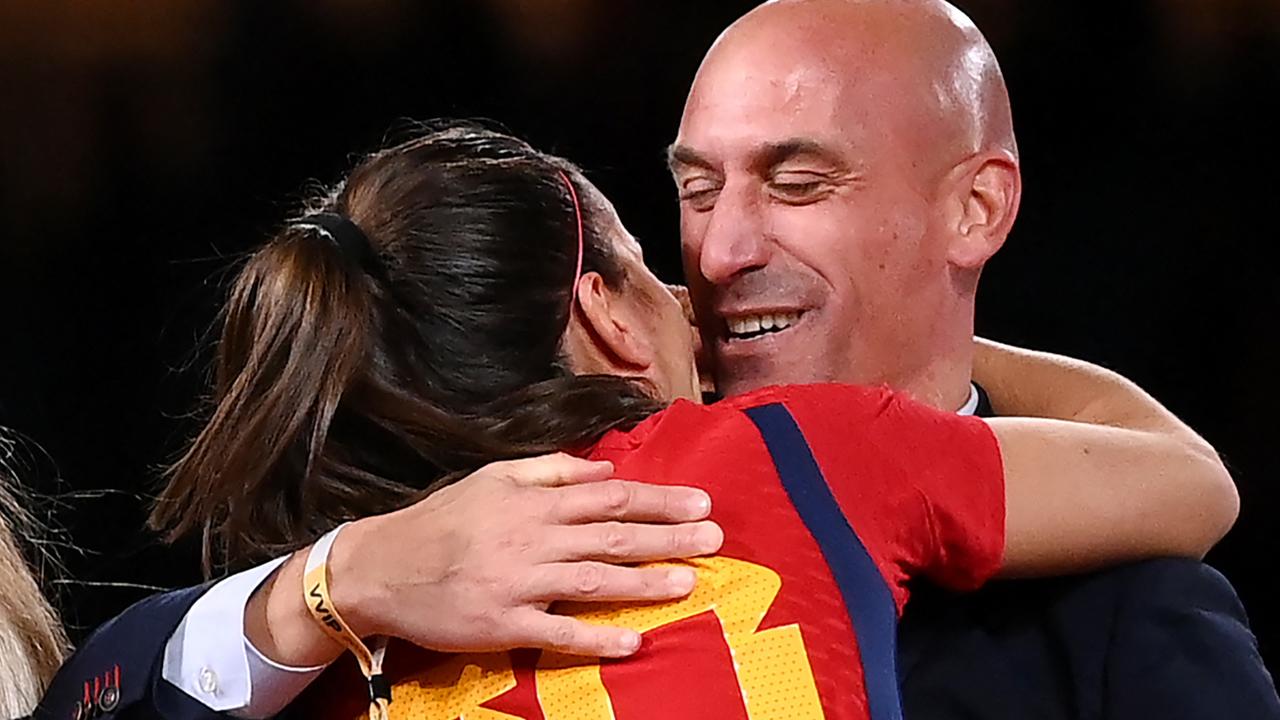
Exploring the Rubiales Scandal and Its Implications
In the world of soccer, where triumphs and controversies intertwine, the recent incident involving the president of the Spanish soccer federation, Luis Rubiales, has ignited a fiery debate. Reports from Spanish media suggest that Rubiales might resign from his position after five years of leading the body. The controversy stems from an episode where he kissed a player during a celebration and his subsequent actions during a significant match. This article delves into the details of the incident, the potential repercussions, and the broader implications for both Rubiales and the soccer community.
The Kiss that Stirred Controversy
The Spanish soccer federation president found himself in hot water due to an unexpected gesture. Following Spain’s victory in the Women’s World Cup final, Rubiales kissed player Jenni Hermoso on the lips during the trophy and medal ceremony. This gesture, intended to be celebratory, quickly became the center of attention and sparked a wave of discussions.
The incident prompted FIFA, the global governing body of soccer, to intervene. FIFA’s disciplinary committee initiated an inquiry to determine whether Rubiales’ actions violated the organization’s code of conduct and brought the sport and FIFA into disrepute. The core issue here is whether Rubiales’ behavior aligns with the principles of decency expected from a soccer official.
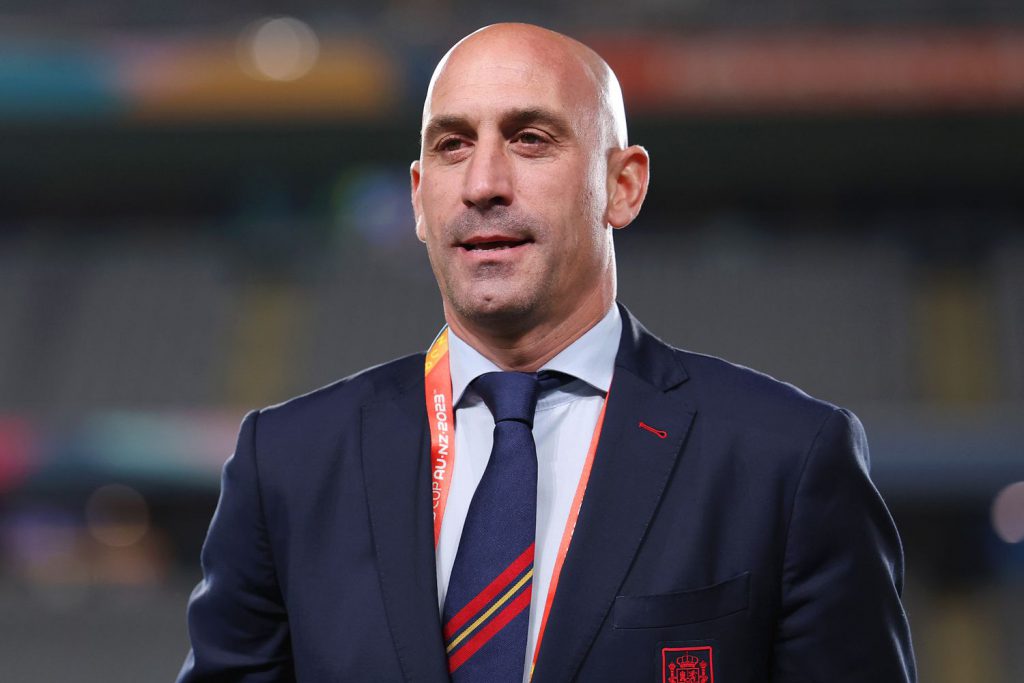
Amidst the uproar, reports surfaced indicating that Rubiales might step down from his role as the president of the Spanish soccer federation. The speculation has fueled further debates about whether resignation is an appropriate response to the controversy. If Rubiales indeed resigns, it would mark the end of his five-year tenure at the helm of the organization.The incident has drawn mixed reactions from both the public and the players. While some view the kiss as a harmless expression of celebration, others see it as an inappropriate breach of professional boundaries. Player Jenni Hermoso expressed discomfort with the kiss, and the national players’ union, once led by Rubiales, called for accountability regarding his actions.
FIFA issued a statement reaffirming its commitment to upholding the integrity of all individuals associated with the sport. The organization condemned any behavior that contradicts this commitment. While FIFA did not specify the exact acts under investigation, their emphasis on maintaining the sport’s reputation is clear.
Beyond the kiss, Rubiales’ conduct during the match drew attention. He was seen making a gesture by grabbing his crotch as a victory celebration. This action further added to the controversy, raising questions about appropriate behavior for a soccer official, especially in the presence of dignitaries.
The FIFA disciplinary panel has the authority to impose various sanctions on individuals found in violation of its code of conduct. These sanctions can range from warnings and fines to suspensions from soccer-related activities. The severity of the punishment will depend on the outcome of the investigation and the panel’s assessment of the situation.
Luis Rubiales holds the position of vice president at UEFA, the governing body for soccer in Europe. This role carries both prestige and responsibilities. The controversy has yet to garner a response from UEFA president Aleksander Čeferin, leaving the soccer community curious about the organization’s stance on the issue.
Rubiales is currently spearheading a bid to host the men’s World Cup in 2030, a joint effort involving Spain, Portugal, Morocco, and possibly Ukraine. However, his involvement in the Rubiales Scandal has raised concerns about the bid’s viability and the image projected to potential supporters.
The incident has wider implications for both the Spanish soccer federation and the broader soccer landscape. It highlights the importance of maintaining professionalism and ethical conduct within the sport’s leadership. The outcome of this controversy could set a precedent for addressing similar situations in the future.
As the Spanish soccer federation holds an emergency meeting to address the situation, the soccer community awaits a decision. The meeting’s outcome will not only impact Rubiales’ future but also shape the federation’s trajectory. The controversies surrounding this incident underscore the need for open discussions about behavior expectations and consequences.
The Rubiales Scandal serves as a reminder that even in the world of sports, actions can have far-reaching consequences. The incident involving the kiss and subsequent gestures has ignited discussions about leadership, professionalism, and the image projected by soccer officials. As FIFA investigates the matter, the soccer community anticipates the outcome and the potential shifts it may bring.
Football
Vlahovic Double Helps Juventus beat Salernitana 3-0.
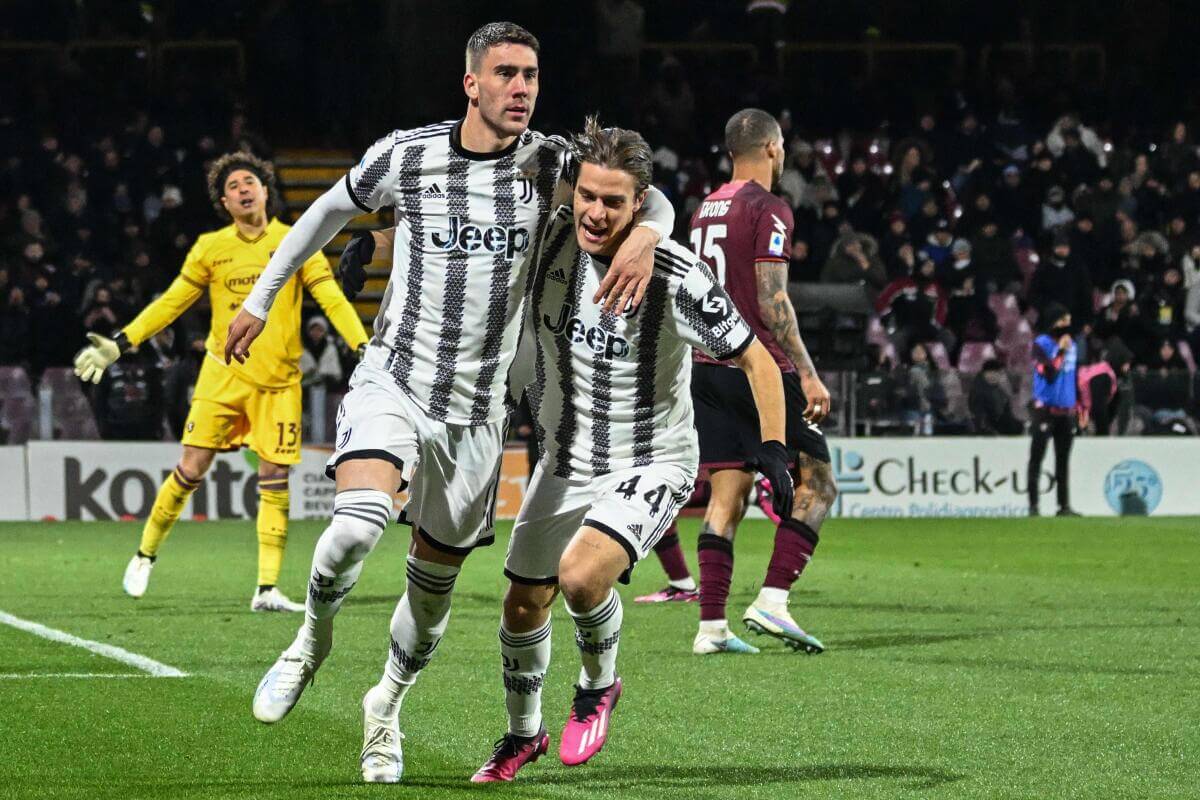
Juventus beat Salernitana 3-0 in Serie A on Tuesday, with striker Dusan Vlahovic scoring two goals and setting up another to lift the visitors to 10th in the table.
Vlahovic, a Serb who has been injured a lot this season but played in the league for the first time since October, found his old form again in this match.
Hans Nicolussi gave Juventus a penalty kick when he sent Manuel Locatelli off in the 26th minute. Vlahovic converted the penalty.
Vlahovic almost scored a second goal in the 37th minute, but his shot from the edge of the box from an acute angle went just past the post.
At the end of the first half, Filip Kostic made it 2-0 when he tapped the ball in from close range after Vlahovic’s initial shot had bounced into his path.
In the last seconds before the halftime break, Locatelli ran into the penalty area unchallenged and gave Juventus a chance to score a third goal. However, Salernitana goalkeeper Guillermo Ochoa reacted quickly to prevent Locatelli from lobbing the ball over him.
80 seconds into the second half, Vlahovic scored his second goal when he ran through the penalty area and shot the ball flat into the right corner.
In the 51st minute, Junior Zambia hit a cross that reached almost everyone in the box, but Salernitana striker Boulaye Dia could not stretch far enough to put the ball in the open net.
“The team responded well and we played a good first half. But after taking a 3-0 lead, we got a little too comfortable and allowed too many shots on goal. We did not move enough and stayed in the same places, and the players know we have to do better,” Allegri said.
“In the first 10 minutes we played the ball too often down the right side. We need to improve the passing game, become more supple and keep things simple.”
Angel Di Maria hit the crossbar after 53 minutes and Moise Kean hit the post just before the end of the game, preventing Juve from adding to their tally.
The win moved Juventus to 26 points after 21 games, while Salernitana dropped to 21 points and 16th place.

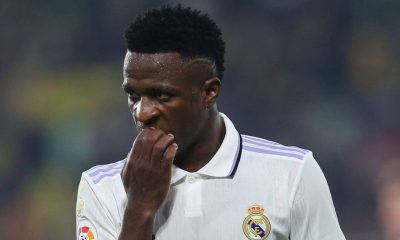







You must be logged in to post a comment Login